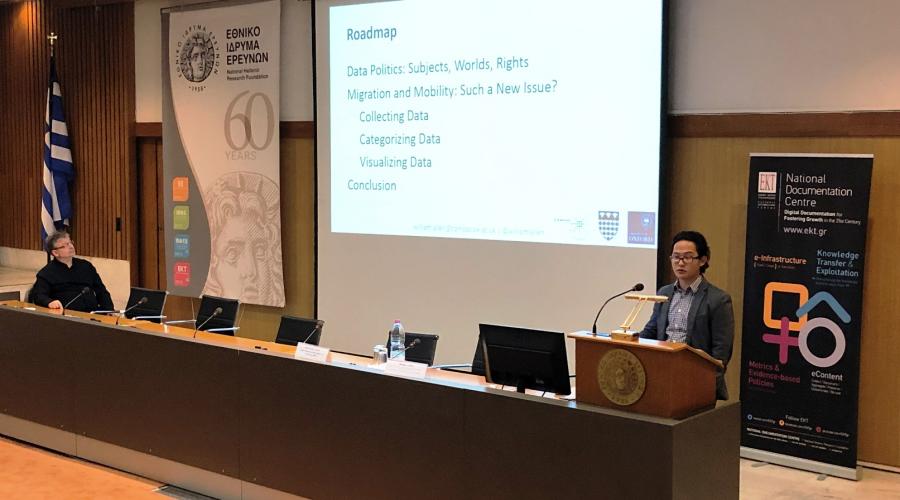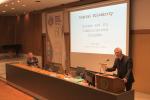
The talk on the political dimensions of data and their correlation with human migration and mobility given by political scientist William Allen, on Wednesday 8 May 2019, brought to an end the series of EKT lectures on ‘Big Data, New Media, Documentation Issues: Learning from Pioneering Initiatives'.
In his contribution ‘The Politics of Big Data, Migration and Mobility’ W. Allen challenged the prevalent perception that big data ‘speak’ for themselves without requiring any theory for analysis and processing.
W. Allen (Examination Fellow in Political and Development Studies, Magdalen College, University of Oxford, Research Officer, Centre on Migration, Policy, and Society / COMPAS), in the 4th and final lecture in the series, claimed that data politics is central to many urgent issues of social life, and the politics related to the collection, use and processing of data has as much societal, cultural and affective dimensions as technological and practical ones. Although his research focuses on migration and mobility, his approach and conclusions can be widely used in the study of Big Data.
Dimensions of data politics
What do we mean by 'the data politics '? The term is used to stress that data can have great power on a social and political level, but this is not uniquely defined by the nature of these data, it depends on how it is used by potential users (governments, companies, citizens, etc.). It can be looked at from 3 dimensions:
a) data worlds: material objects, landscapes, and infrastructures associated with data and their transmission
b) data subjects: how data collection, filtering, and usage create new kinds of individuals that relate to each other in new ways
c) data rights: this dimension is associated with who owns the data generated. For example, does a user of the Internet have exclusive ownership of the data they have produced when using internet or can the state and companies make claims on this property?
Considerations for data collection
But how relevant is data politics to migration and mobility in particular? This relationship has three dimensions: data collection, data categorisation, and data visualisation. The collection of data presents significant practical difficulties and questions which cannot be answered in an algorithmic and ‘neutral’ way. For example, how do we know that the data reflect what we think they reflect, in other words, how do we know that we actually know something? As an example to explain his position, W.Allen cites the use of mobile phones by refugees when moving from their own country to another.
Mobile phone companies hire experts in data collection to study the refugee movements through the ‘tracks’ their phones leave in order to better understand their movements and be able to offer services to help them in these moves. But how reliable can data which is generated by the mobile phone use of people who may wish to remain ‘invisible’ for the longest time possible be, or who keep their phones turned off for most of their journey because they do not know when they will be able to recharge them? In such cases, the data obtained will be very different from what actually happens.
Another issue that arises from this example concerns ethics. How certain can we be that the purpose of the collection of specific data intended to benefit refugees will not change in the future in order to control and manage migration flows?
How to categorise data
The debate on data categorisation takes two directions: defining subjects and predicting future actions of subjects through categorisation. Data politics in this case recognises that the definition of a subject is never neutral, as every effort at a definition leaves out major category groups. The categorisation example used here by W. Allen is the definition of a migrant. According to the UN, a migrant is anyone who has lived outside the country for more than one year. As he explained, if we think about those of us who fall into the category of migrant, we may end up with different definitions, which would probably be at odds with the official UN definition.
Moreover, the fact that we can have sophisticated data does not automatically mean that we have sophisticated analysis of these data.
The importance of the human factor in security and border protection should not be underestimated and despite the increased role played by technology in guarding borders, W. Allen demonstrated, through his convincing examples, just how crucial the social dimension really is in data politics.
The importance of visualisation
Apart from importance of data collection and categorisation is visualisation. Data visualisation has always aimed to enable the understanding of the data and is of great importance to science in the long term. In this respect, data politics involves the participation of many people and groups who have different interests, motives and agendas. A scientist’s visualisation of the data he produces may be quite different from that of visualisation professionals, institutions, journalists etc. The result of visualisation is not unambiguous, depending on who is involved in the process and what aspect of data they wish to highlight to make their argument persuasive.
So what is the point of studying data politics in general and Big Data in particular? For start, it would allow us to go beyond dilemmas such as ‘is Big Data good or bad’ taking for granted that Big Data is here to stay . Answering questions on the effectiveness of big data and its contribution to society depends on social and cultural aspects.
Questions such as how the data is used, by whom and for whom it is collected, under what circumstances and in what context collected data is used will help to set an agenda for critical data politics. Such questions could direct a research agenda that would aim to understand why the data are of value not only for governments, businesses and the media, but also for citizens and migrants themselves.
The lecture series was organised by the National Documentation Centre's Scientific Board with the support of the Interdepartmental Programme of Graduate Studies in 'Science, Technology, Society-Science and Technology Studies' National and Kapodistrian University of Athens.
The first lecture was given by Andreas Fickers, Professor for Contemporary and Digital History, Director of the Luxembourg Centre for Contemporary and Digital History (C²DH), Head of the Digital History Laboratoryon 6 February. This was followed on 20 March with a lecture by Christos Arvanitidis Head of Research, Institute of Marine Biology, Biotechnology and Aquaculture, Hellenic Centre for Marine Research (HCMR). Jürgen Neyer, Professor and Vice-President of International Affairs, Director of the Centre for the Internet and Human Rights (CIHR), European University Viadrina.















